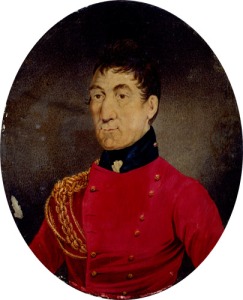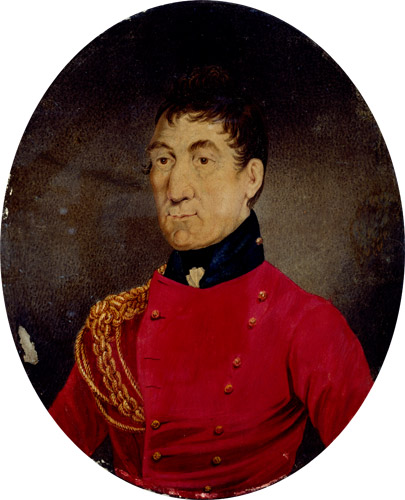
In The Guardian Australia online this week there has appeared an article that asks the question: ‘Was Governor Lachlan Macquarie a terrorist?‘
Paul Daley writes:
Macquarie is the Australian leader who used terrorism and slaughter to quell hostile Indigenous resistance to invasion and dispossession.
The colonial frontier was a violent location and many people suffered and died. Colonialism wreaked havoc on many cultures around the globe.
Was Governor Macquarie any better or worse than any other colonial administrator?
Over next 150 years it is estimated that over 20,000 Aboriginal Australians were massacred in frontier wars.
Is it fair to pick on Macquarie?
Macquarie orders that surrounded what is called the Appin Massacre in 1816 were quite brutal:
On any occasion of seeing or falling in with the Natives, either in Bodies or Singly, they are to be called upon, by your friendly Native Guides, to surrender themselves to you as Prisoners of War. If they refuse to do so, make the least show of resistance, or attempt to run away from you, you will fire upon and compel them to surrender, breaking and destroying the Spears, Clubs and Waddies of all those you take Prisoners. Such natives as happen to be killed on such occasions, if grown up men, are to be hanged up on Trees in Conspicuous Situations, to Strike the Survivors with the greater terror
ABC Radio National has recently broadcast a discussion on Life Matters called:
Was ‘The Father of Australia” , Lachlan Macquarie, complicit in a mass murder?
The programme asks the question:
When Governor Lachlan Macquarie ordered his soldiers to inflict ‘terror’ a group of aboriginal people at Appin, south of Sydney in 1816, did he then try to cover up what happened next?
The programme notes state:
In this program, we ask whether Macquarie tried to cover up an 1816 massacre of 14 aboriginal men, women and children at Appin, south of Sydney, by soldiers acting on his orders to “strike terror” into the indigenous population.
The participants in the RN programme were historians Grace Karskens and John Connor, journalist Paul Daley, Deputy Chair of the Tharawal Land Council Glenda Chalker.
The Appin Massacre is explored in a new exhibition at the Campbelltown Arts Centre called With Secrecy and Dispatch. The bicentenary of the Appin Massacre is 16 April 2016 when ‘Governor Lachlan Macquarie ordered the Aboriginal people within the region of Appin, NSW, be captured and or shot if they try to escape, as well as the displacement of their communities’.
Using the Appin Massacre as a catalyst, six Aboriginal Australian artists and four First Nation Canadian artists have been commissioned to create new works that either deal directly with the Massacre or draw from the shared brutalities across both nations.
New South Wales Colonial Frontier and Transportation
Govenor Macquarie was one of many actors on the colonial frontier in New South Wales. The colony was a military garrison and a penal settlement. Life was brutal. Life as a transported convict was brutal. Transportation as it was practised in the British Empire was close to slavery. Some in England in the Ant-Transportation League thought it so. A League was established in Sydney in 1849 to opposed landing convicts in Sydney.
The colonial frontier wars in North America and elsewhere
The colonial frontier wars in North America resulted in the deaths of thousands of Indians. There were frontier wars in Africa. The Spanish incursions into South and Central American could be called frontier wars.

‘Sugar slaves’ of Queensland
Were the actions of Macquarie as military administrator any worse than what civil administrators did in to so called ‘sugar slaves’ of Queensland?
According to the Queensland Historical Atlas states:
Australian South Sea Islanders today consider our ancestors to have been the Sugar Slaves. South Sea Islanders, transported to Australia as a cheap source of labour, worked in the development and establishment of the new Queensland sugar industry.
Read more on colonial frontier violence around the world
Read Paul Daley’s full article in the Guardian Australia click here
Radio National programme Click here
Dictionary of Sydney blog Click here
Read about the North American-Indian Wars Click here
Read about the Australian Frontier Wars Click here
Read about the New Zealand Maori Wars Click here
Read about ‘slavery’ in the Queensland sugar industry Click here
The exhibition With Secrecy and Dispatch at Campbelltown Arts Centre Click here
Lachlan and Elizabeth Macquarie Journals in project Journeys in Time 1809-1822 Click here
Lachlan and Elizabeth Macquarie Archive Click here



By chance I have just heard Ellen Fanning on ABC RN Life Matters, this morning, with Tharawal elder Glenda Chalker, reading and discussing Macquarie’s original documents at the State Library and considering this argument, with two historians, about “was he a terrorist”. The issue at Appin (in April 2016) was that the Tharawal people gave no “show of resistance” at all. It was 2 o’clock in the morning and the people were sound asleep, The fact that the military attacked in these circumstances, was quite contrary to British law and risked ending the commander’s career and Macquarie’s had it become known. Reporting was therefore oblique and secretive in style, as I understand it. The fact that Aboriginal bodies were beheaded and hung in high places to deter resistance and the heads sent to London, compares with the much condemned contemporary behaviour of Islamic extremists. Those heads were returned to Australia in 1991 and are currently held in a warehouse in Canberra.
Arguments which seem to prevail at present are that colonial powers at the time were all behaving in similar ways, so this was no worse than any other. For Aboriginal people, context of the times is irrelevant. They did suffer from invasion and where they could, fought back. Australia’s colonial history is much more complex and nuanced than is frequently portrayed. We can’t change it, but we need to face up to it and recognise the continuing consequences to Aboriginal Australians. In an atmosphere of mutual respect, we have a great deal to learn from each other.
What do you think? You do not seem to give an answer to the question you pose? You seem to be excusing Macquarie’s conduct based on “context of the time’. If this how you feel?